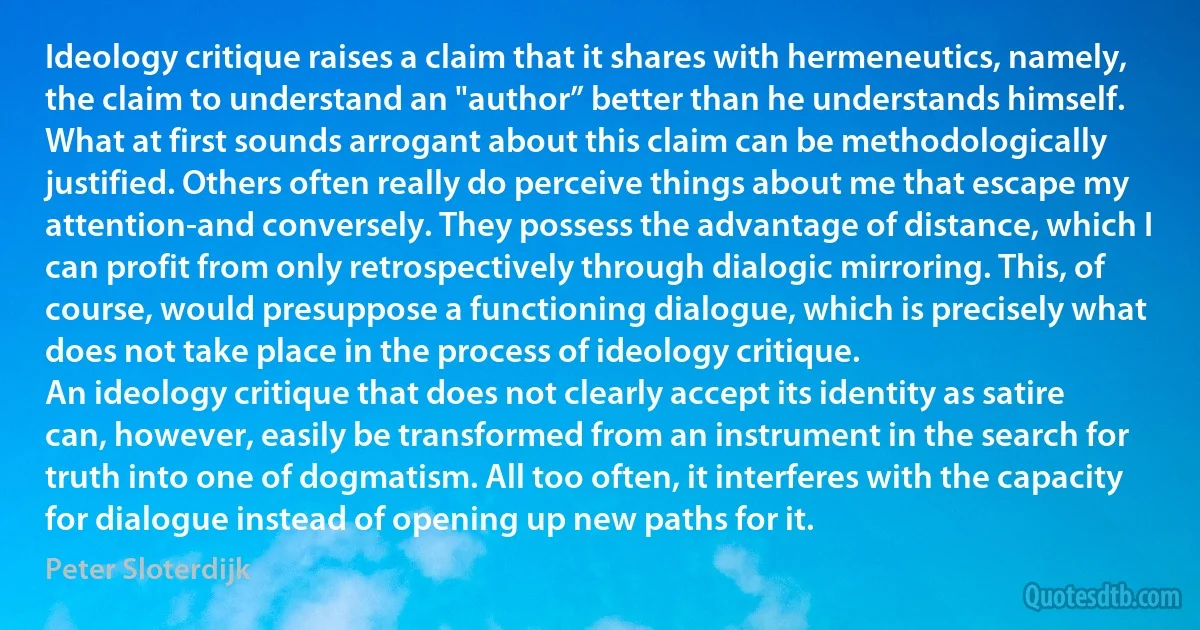
Ideology critique raises a claim that it shares with hermeneutics, namely, the claim to understand an "author” better than he understands himself. What at first sounds arrogant about this claim can be methodologically justified. Others often really do perceive things about me that escape my attention-and conversely. They possess the advantage of distance, which I can profit from only retrospectively through dialogic mirroring. This, of course, would presuppose a functioning dialogue, which is precisely what does not take place in the process of ideology critique. An ideology critique that does not clearly accept its identity as satire can, however, easily be transformed from an instrument in the search for truth into one of dogmatism. All too often, it interferes with the capacity for dialogue instead of opening up new paths for it.
Peter SloterdijkRelated topics
advantage claim course critique distance dogmatism escape hermeneutics ideology mirroring place profit search take truth others things functioningRelated quotes
We have to stop pretending that Islam is merely a religion-it is primarily a totalitarian ideology that aims to conquer the West. A free society should not grant freedom to those who want to destroy it. Every halal shop, every mosque, every Islamic school, and every burka is regarded by Islam as a step toward the ultimate goal of our submission. As such, we must close down all Islamic schools, for they are totalitarian institutions where young children are indoctrinated into an ideology of violence and hatred. We must also close down all radical mosques and forbid the construction of new mosques, which Islam regards as symbols of its triumph. And we must ban the burka-people's faces should not be hidden in society, for it is our faces that give us our identity and our fundamental means of communication with others.

Geert Wilders
Oh! human stupidity, do you not perceive that, though you have been with yourself all your life, you are not yet aware of the thing you possess most of, that is of your folly? and then, with the crowd of sophists, you deceive yourselves and others, despising the mathematical sciences, in which truth dwells and the knowledge of the things included in them. And then you occupy yourself with miracles, and write that you possess information of those things of which the human mind is incapable and which cannot be proved by any instance from nature. And you fancy you have wrought miracles when you spoil a work of some speculative mind, and do not perceive that you are falling into the same error as that of a man who strips a tree of the ornament of its branches covered with leaves mingled with the scented blossoms or fruit.

Leonardo da Vinci
The prevailing style of management must undergo transformation. A system cannot understand itself. The transformation requires a view from outside. The aim of this chapter is to provide an outside view-a lens-that I call a system of profound knowledge. It provides a map of theory by which to understand the organizations that we work in. The first step is transformation of the individual. This transformation is discontinuous. It comes from understanding of the system of profound knowledge. The individual, transformed, will perceive new meaning to his life, to events, to numbers, to interactions between people. Once the individual understands the system of profound knowledge, he will apply its principles in every kind of relationship with other people. He will have a basis for judgment of his own decisions and for transformation of the organizations that he belongs to.

W. Edwards Deming
Today 'nationalism' is out of fashion among the opinion-formers. Thanks to a superficial misreading of history, it is accused of having been responsible for two world wars and has widely come to be regarded as a political sin of the first magnitude, fortunately found only in such antiquated and obsolete figures as General de Gaulle. In fact the real danger comes from ideologies not nationalism; for while a nation may properly respect the nationhood of others, an ideology knows no frontiers...Once [the Tories] lose their claim to be, in the fullest sense, the 'national party', they are left, as they are in danger of being left today, either as the party of the 'individual' – a noble but to most people an austere and forbidding creed – or else as the party of the middle classes, which condemns them to a permanent minority.

Nigel Lawson
Now, obviously, the human race is on the point of an extremely interesting evolutionary development. The first step towards escape from this vicious circle is to recognize that the apparent "ordinariness" of the world is a delusion. If we could become deeply and permanently convinced that the world "out there" is endlessly exciting, we would never again allow ourselves to become trapped in the swamp of "taken-for-grantedness". And we would become practically unkillable. Shaw says of his "Ancients" in Back to Methuselah "Even in the moment of death, their life does not fail them". "Life failure" is that feeling that there is nothing new under the sun, and that we all have to accept defeat in the end. If we could learn the mental trick of causing the dynamo to accelerate, this illusion would never again be able to exert its power over us.

Colin Wilson
